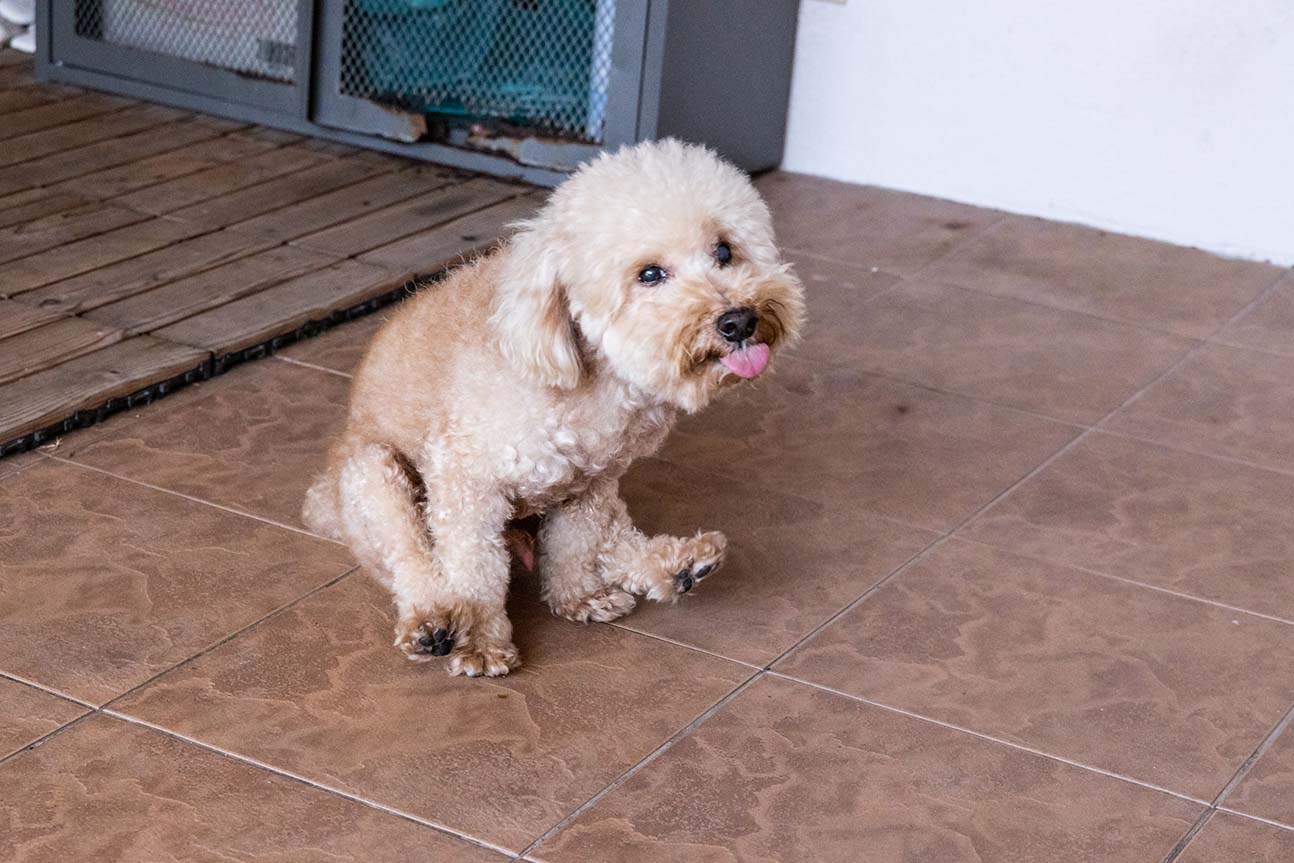Reviewed by Dr. Sarah Yosry
Updated on 19/05/2025
Reading time 4 min.
Overview
Severity: Low
Life stage: All
You may have giggled if you have ever witnessed your dog scooting—running its bottom against the floor. When scooting becomes a repeated behavior, though, it is often an indication of irritation or a medical issue that must be addressed by a vet. Dogs scoot in response to itch, irritation, or even pain in the anal region. One-time scoots may not warrant alarm, but repeated bottom-scooting needs an appointment from your clinic vet.
In this article, we are going to discuss common scooting causes, signs of issues, when to see a vet in my area, and methods for keeping your dog healthy and scoot-free. No matter if you are in the UAE and need a good vet in Dubai or just need general information, we have everything for you.
Reasons a Dog Dragging Its Bottom on the Floor
Anal Gland Problems
One of the most common causes of dragging bottoms in dogs is impacted or infected anal glands. Dogs have two small anal glands that release a pungent liquid during defecation. When these glands are unable to empty normally, they can become swollen, painful, and even infected. Scooting is usually an attempt by the dog to release this pressure. Other signs are:
• Fishy smell from the back
• Licking and/or biting around the tail
• Redness or swelling around the anus
• Blood or pus in the rear
Brachycephalic breeds are particularly susceptible to this problem. Treatment can include manual expression of the glands by a vet, and in some instances, antibiotics or inflammation-reducing medications can be prescribed. Without treatment, the glands can rupture and cause serious complications. The following symptoms in your dog warrant an appointment at a vet clinic around me or a reputable veterinary clinic in Dubai.
Worms and Parasites
One of the frequent causes of scooting is intestinal worms, particularly tapeworms. Tapeworms eliminate segments in the form of white rice-like grains in and around your dog’s anus, which inflame and cause intense itching. Canines scoot due to relief from discomfort from these worms.
Symptoms of worms are:
• Visible segments around the anus or within stool
• Weight loss despite normal eating
• Soft stools or diarrhea
• Scooting or bloating
Tapeworms are usually disseminated by fleas, and thus, good flea control is also necessary. In case of parasite signs, take your dog for a fecal examination and deworming treatment from a vet clinic in Dubai or a pet clinic. Deworming medications are rapid in effect and act quickly, while a follow-up protocol of parasite prevention ensures that a repeat infestation is averted.
Allergies and Skin Irritation
Allergies, both food and environmental in origin, can lead to itching around a dog in its hind legs, resulting in scooting. When redness, inflammation, or drying of skin around the anus occurs, scratching ensues. They consist of
• Grains, chicken or dairy (in food)
• Pollen, dust mites, or mold
• Cleaning products or grass
Allergic canines can also show other signs, including foot chewing, ear infections, or sneezing. The first step in treatment involves the detection of the allergen using a blood or skin test. A veterinary clinic in Dubai can prescribe a hypoallergenic diet, antihistamines, or medicated shampoos for skin irritation and inflammation.
It is crucial not to ignore allergy-type scooting since long-term irritation can result in infections if the skin becomes compromised from scratching or scooting.
Matted Fur or Debris
If your dog has long or thick fur on its backside, there is a good possibility that matted fur or dirt is the cause of scooting. Dirt, fecal matter, or plant matter can become lodged in the fur around the anus and irritate the skin. Dogs can scoot around on the floor in an attempt to eliminate what is obstructing them.
Prevalent in breeds such as Poodles, Shih Tzus, and Maltese, this issue can easily be avoided by proper grooming. Maintain the fur around your dog’s anus trimmed and groomed. Wherever there are already formed mats, do not try to cut them off by yourself, since it is quite easy to hurt the delicate skin under them. Rather, make an appointment for a visit to a nearby pet clinic or a vet for safe grooming and a check-up.
Scooting may, in some instances, lead to minor skin abrasions or skin infections, which can be easily treated by your veterinarian through topically applied ointments or antiseptic treatments.
Constipation or Fecal Impaction
If the dog strains when defecating or has hard, dry stool, it can lead to constipation or fecal impaction. The act of defecation can irritate or even cause micro-tears around the anus, which in return lead to scooting. Symptoms of constipation are:
• Infrequent bowel movements
• Crying or straining during defecation
• Scooting after pooping
• Lethargy or reduced appetite
Mild constipation can be treated with dietary fiber, pumpkin, or an increase in water. Severe or persistent constipation requires professional care. A veterinary clinic in Dubai can soften impacted stool through enemas or recommend stool softeners and also screen for underlying medical issues responsible for constipation.
If scooting and discomfort are observed in your dog during potty breaks, do not delay. Prompt intervention from a vet clinic in Dubai can alleviate your dog’s discomfort and avoid complications such as rectal prolapse.
Rectal Prolapse or Tumors
Less often, more serious issues such as rectal prolapse or tumors within or around the anus can lead a dog to scoot. Rectal prolapse occurs when part of the rectum bulges through the anus, usually from repeated straining. Tumors in either malignant or benign form can also form in that region, causing discomfort and abnormal scooting.
• Watch for these symptoms.
• Visible tissue from the anus
• Bleeding from around the rectum
Difficulty in defecation or painful defecation • Scooting accompanied by crying or whimpering, some conditions must be treated right away by a veterinary hospital or veterinarian near my location capable of performing diagnostic tests and possibly surgery. Rectal prolapse is an emergency and must not be postponed. Regular checkups from a Dubai veterinary clinic catch these conditions in their early stages. Vets can run scans or take a biopsy to diagnose the cause and extent of the problem. Prompt treatment can dramatically enhance recovery and your pet’s quality of life.
When to Visit a Veterinary Clinic
Scooting every once in a while does not always indicate an emergency, but repetitive or severe scooting is an indication to visit a vet clinic around me. A veterinary check-up is indicated for these signs:
• Scooting more than once daily
• Redness, swelling, or bleeding around the anus
• Discharge or foul-smelling odor from anus
• Worms or objects that are visible
• Constipation or Straining
At your veterinary clinic, your vet might do a physical check-up, fecal exam, anal gland expression procedure, allergy testing, or imaging tests based on what is suspected.
Early detection and treatment can help in averting complications, minimize discomfort for your dog, and get them back in their happy, playful form.
How to Prevent Scooting in Dogs
Most scooting causes can be avoided through proper care and routine. These are some tips that minimize the likelihood of your dog scooting:
• Brush often, particularly for long-haired breeds
• Feed your dog a balanced, high-fiber diet
• Ensure proper hydration
• Use monthly flea preventatives to avoid parasite infections
• Observe for food or environmental allergy signs
• Visit your vet for regular anal gland examinations
• Exercising your dog daily aids in healthy digestion
With these steps incorporated, you keep your dog in healthy skin and digestion, both crucial in averting bottom-dragging.
Conclusion:
Scooting is not just a cute quirk—it’s a cry for help from your dog. Parasites, blocked glands, or even something quite serious may be the cause. Don’t ignore the hints! A diagnosis and treatment plan from a veterinarian can easily take care of your dog’s distress and eliminate future issues.
If you are in the UAE and looking for a vet clinic in Dubai that pet owners can trust, Modern Vet Hospital provides sophisticated diagnostics, expert care, and a caring approach to every pet’s individual needs. Book your appointment with Modern Vet Hospital now and give your dog the care they deserve—from scoot to recovery.
Share this, choose your platform!
Writen by
Dr.Sarah Yosry
DVM
A product of a rich Australian/Egyptian heritage, Dr. Sarah Yosry stands as a testament to the union of diverse cultures and a shared love for animals.



